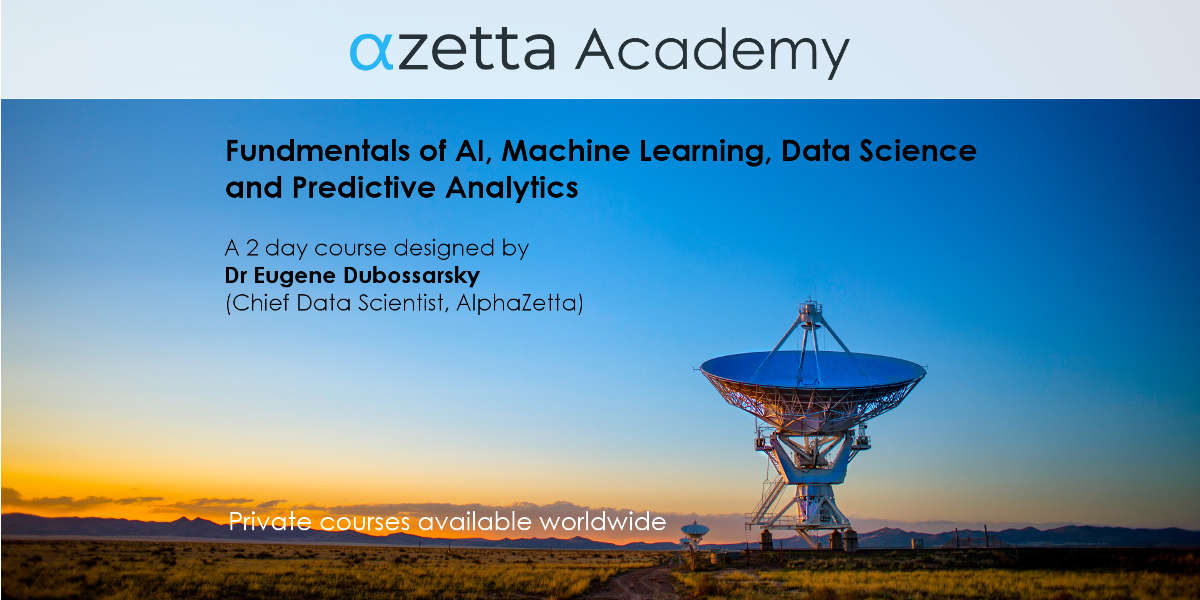This course is an intuitive, hands-on introduction to the core concepts in AI, data science and machine learning. This is your artificial intelligence 101, data science 101 and machine learning 101 as there is significant overlap. The training focuses on key skills, leaving you with a deep understanding of the foundations of AI and data science and even some of the more advanced tools used in the field.
The skills taught are transferable to all software platforms, and the course does not involve coding, or require any coding knowledge or experience. A tool with a graphical user interface is used so you can focus on learning the central skills and ideas.
Key skills taught include building, assessing, selecting and deploying predictive models, as well as employing some of the most commonly used methods in the field, including general linear models (GLMs), and advanced methods such as random forests. This also makes it your predictive analytics 101.
The course also covers key issues of data science practice in a work environment, and directs you to a range of further learning directions.
This is our leading course; it has transformed the machine-learning (ML), artificial intelligence (AI) and data science practice of the many managers, sponsors, key stakeholders, entrepreneurs and beginning data analytics and data science practitioners who have attended it.
See Course Outline below for detailed day-by-day outline.
Discounts
Face to face public courses: early bird pricing is available until 2 weeks prior. Group discounts: 5% for 2–4 people, 10% for 5–6 people, 15% for 7–8 people, and 20% for 9 or more people. Discounts are calculated during checkout.
Online public courses: available at a 25% off the face-to-face courses as a special introductory price. to groups or to individuals who want to follow a curriculum program and attend multiple courses:
- 2-4 courses/attendees 10% off
- 5+ courses/attendees 20% off
Hurry as bookings will close 1 week before each course. Group discounts are calculated during checkout on individual courses. Individuals can book multiple courses at a discount – please enquire.
Additional Information – Fundamentals of AI, Data Science, Machine Learning and Predictive Analytics
| Audience | C-Suite, Management, Business, Expert This course is suitable for anyone in management, administrative, product, marketing, finance, risk and IT roles who works with data and wants to become acquainted with core concepts in AI and data science, as well as modern data analysis tools. |
| Prerequisites | No prior knowledge of R is required to take this course. However, students should have completed or have equivalent knowledge to the course Data Literacy for Everyone. |
| Objective |
|
| Format | Class |
| Duration | 2 days |
| Course Author | Dr Eugene Dubossarsky |
| Trainer | Courses are taught by Dr Eugene Dubossarsky and/or his hand-picked team of highly skilled instructors. |
| Delivery Method | Online, in-person at AlphaZetta Academy locations or on-premise for corporate groups |
Here’s what David Andersen thought of this course in a short video:
Private and Corporate Training
In addition to our public seminars, workshops and courses, AlphaZetta Academy can provide this training for your organisation in a private setting at your location or ours, or online. Please enquire to discuss your needs.
Scheduled Public Courses
BOOK NOW ⇓
Private and Corporate Training
In addition to our public seminars, workshops and courses, AlphaZetta Academy can provide this training for your organisation in a private setting at your location or ours, or online. Please enquire to discuss your needs.
This is one of our core courses and is part of the Executive, Data Engineering, Data Governance, AI Engineering and Data Science core curricula and it’s an elective in the Data Culture curriculum.
Testimonials
Eugene’s courses are not your standard technical courses where you learn how to put data into a model and get a result. The real life experiences – warts and all – he brings to the instruction mean that attendees walk away with a better understanding of the real life challenges of analytics as well as the technical know-how. We routinely send our team members on these courses to help them get the capabilities that really help our clients get better insights from their data.
Eugene’s introductory course to data science was outstanding. I found the subject matter and delivery fascinating, accessible and informative. Eugene is approachable, interesting to listen to and excellent at simplifying complex concepts. I highly recommend this course for anyone who wants to know what data science—and all the buzz surrounding it!—are all about.





